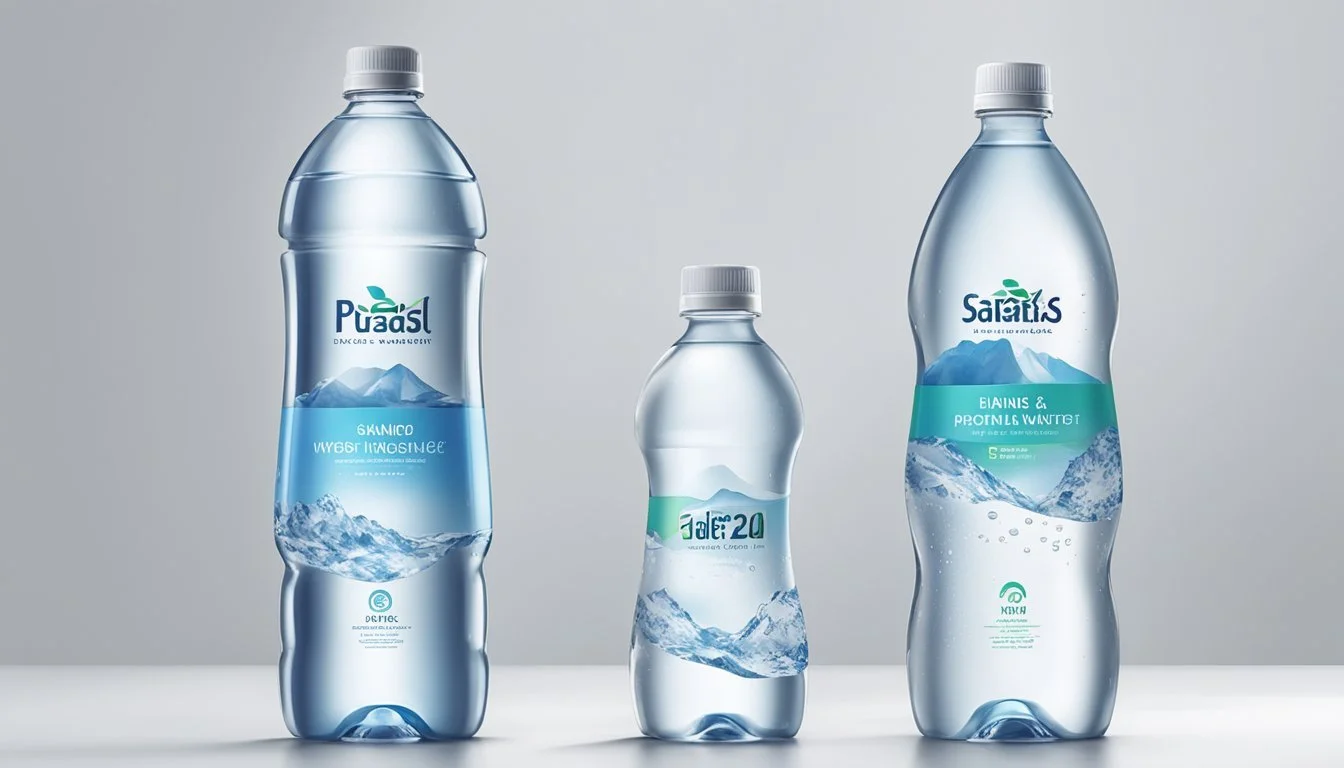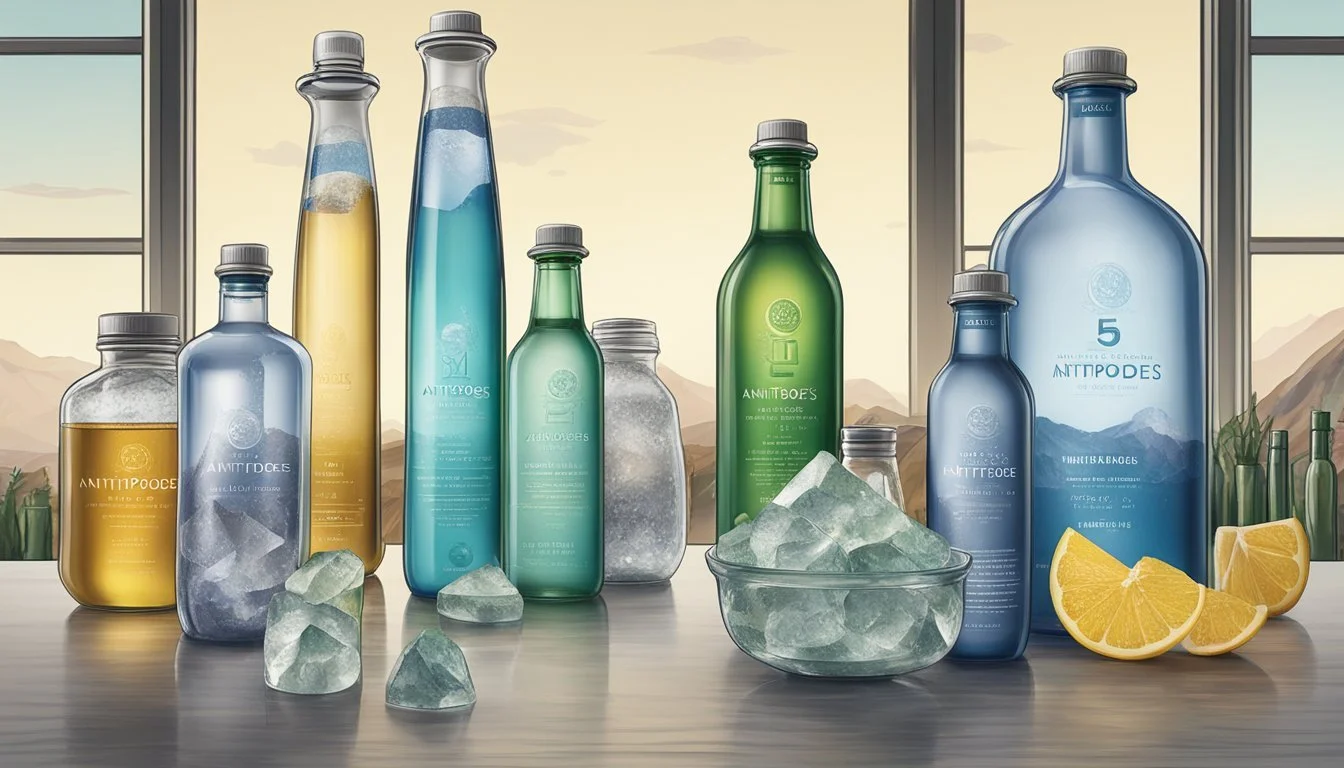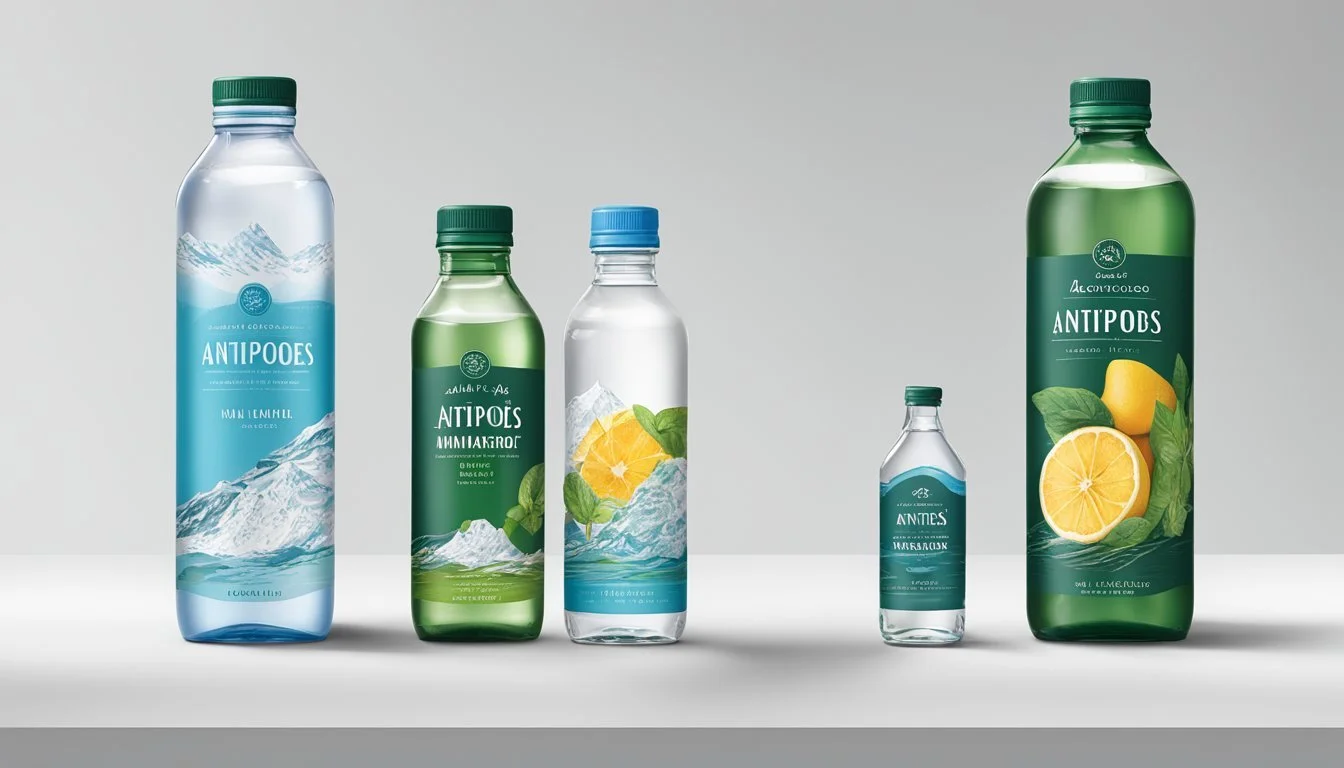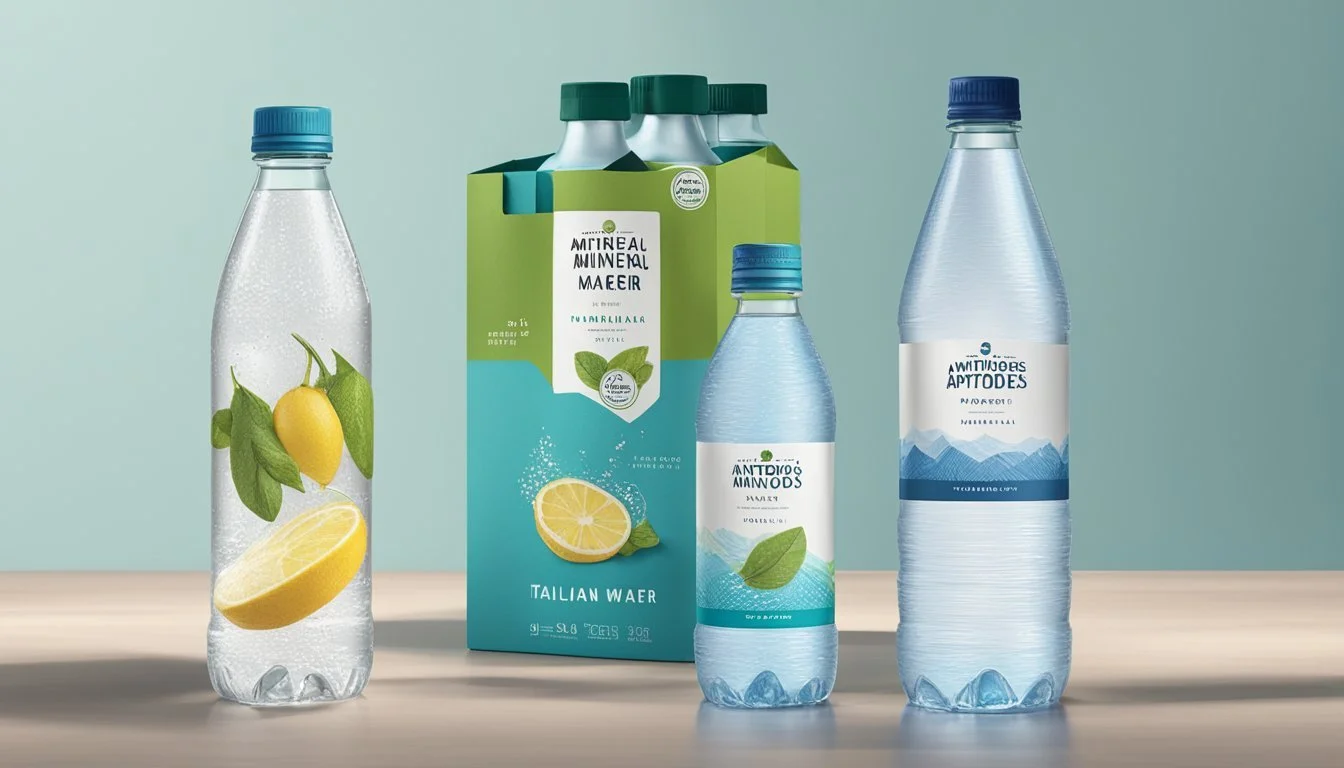Antipodes vs. Whole Foods Italian Still Mineral Water
Battle of the Bottled Waters
Comparing bottled waters can seem like a simple task until you dig into the details. Antipodes Still Water from New Zealand's Bay of Plenty and Whole Foods Italian Still Mineral Water both offer distinct characteristics. Antipodes boasts an impressive 73 mg/l of silica, making it a low-mineral option at 130 mg/l of total dissolved solids and a neutral pH of 7.0.
On the other hand, Whole Foods Italian Still Mineral Water is bottled at the La Galvanina Spa Source in Rimini, Italy. Known for its slight acidity with a pH of around 5, this water brings a different flavor profile compared to the neutral Antipodes.
When it comes to taste, Antipodes's neutral pH and low mineral content give it a clean, crisp flavor. The Whole Foods Italian Still Mineral Water has a unique taste derived from its higher acidity. Ultimately, for those seeking a balanced option with significant health benefits from silica, Antipodes may edge out its Italian counterpart.
Background and Origin of Bottled Waters
Bottled water has a long and rich history, with specific regions known for their high-quality sources. This section delves into the past as well as the particular stories behind Antipodes and Whole Foods Italian Still Mineral Water.
Historical Context of Mineral Water
The practice of bottling water began in 1622 when water from the UK’s Holy Well was first sold commercially. By the 1700s, bottling natural spring water became popular in Europe and the U.S., where the therapeutic benefits of mineral-rich springs were highly valued. Throughout history, places like the Dolomites and Tuscany in Italy have become celebrated for their high-quality natural springs.
Sourcing and Extraction
The sourcing of bottled water is crucial. Mineral water must be collected from protected underground aquifers or springs to ensure purity. Extraction typically involves capturing the water at the source without significant processing to maintain its natural mineral content. Major Italian brands often source from regions like the Dolomites or Tuscany, known for their pristine springs.
Antipodes' Story
Antipodes, a premium New Zealand bottled water brand, is renowned for its pristine source. The water is extracted from an aquifer in the Bay of Plenty, an area with minimal human impact. It is naturally filtered through rock formations, ensuring a pure and clean taste with balanced mineral content. Antipodes has positioned itself as an eco-friendly brand, using glass bottles and emphasizing sustainable practices.
Whole Foods Italian Still Mineral Water's Origin
Whole Foods Italian Still Mineral Water originates from Tuscany, a region famous for its natural springs. Sourced from protected springs in the region, this water maintains a crisp and fresh taste due to its mineral composition. Tuscany’s geological characteristics contribute to the unique profile of the water, making it a desirable choice for those seeking authentic Italian mineral water. The brand’s commitment to quality ensures that each bottle offers consistency and purity.
Chemical Composition and Mineral Content
The comparison of Antipodes and Whole Foods Italian Still Mineral Water involves analyzing their chemical composition and mineral content. This analysis includes examining essential minerals, levels of sodium and calcium, the role of magnesium and potassium, total dissolved solids (TDS), and unique mineral compositions.
Essential Minerals in Water
Mineral water is valued for its essential minerals, which contribute to its taste and health benefits. Both Antipodes and Whole Foods Italian Still Mineral Water contain key minerals such as calcium, magnesium, sodium, and potassium.
Calcium is important for bone health. Magnesium supports muscle and nerve function. Potassium helps maintain electrolyte balance. These minerals not only offer health advantages but also influence the water's taste profile.
Comparing Sodium and Calcium Levels
Sodium content is a critical factor for those monitoring their salt intake. Whole Foods Italian Still Mineral Water is noted for being low in sodium, an important consideration for individuals on low-sodium diets.
Calcium levels in bottled water can aid in daily mineral requirements. For instance, Whole Foods Italian Still Mineral Water and Antipodes both offer varying amounts of calcium, contributing to bone strength and metabolic functions. Precise calcium content can be a deciding factor for consumers seeking waters with higher mineralization.
The Role of Magnesium and Potassium
Magnesium and potassium play significant roles in maintaining health. Magnesium aids in metabolic functions and supports muscle and nerve systems.
Potassium is vital for keeping blood pressure levels stable. The presence of these minerals in both Antipodes and Whole Foods Italian Still Mineral Water makes them beneficial choices for overall health. Consumers seeking these specific minerals can select the water that best fits their dietary needs.
Total Dissolved Solids (TDS)
Total Dissolved Solids (TDS) measure the concentration of dissolved substances in water. Higher TDS generally means a richer mineral content, which can affect both flavor and potential health benefits.
Antipodes has a moderate TDS level, reflecting a balanced mineral presence that contributes to its crisp taste. Whole Foods Italian Still Mineral Water, with its distinct low sodium content, may have a varied TDS level, which provides its unique profile.
Unique Mineral Compositions
Each mineral water brand offers unique compositions influenced by their source locations. Antipodes, sourced from a deep artesian aquifer in New Zealand, contains naturally occurring minerals like silica.
Whole Foods Italian Still Mineral Water, sourced from Italy, offers a mineral profile that includes significant bicarbonate content, contributing to its taste and health benefits. The variations in mineral content between the two brands can help consumers decide based on their specific health preferences and taste profiles.
Health Benefits and Concerns
Both Antipodes and Whole Foods Italian Still Mineral Water offer a range of health benefits, but there are also some concerns to consider. These include their impacts on hydration, digestion, blood pressure, and potential risks associated with mineral content.
Hydration and Health
Hydration is crucial for maintaining overall well-being, and both Antipodes and Whole Foods Italian Still Mineral Water effectively hydrate the body.
Antipodes is sourced from pristine aquifers in New Zealand, known for its purity and balanced mineral content, enhancing its hydration efficiency.
Whole Foods Italian Still Mineral Water contains essential minerals like calcium and magnesium, supporting various bodily functions. Regular consumption helps to meet daily hydration needs, which is vital for skin health, energy levels, and cognitive function.
Digestive Benefits
Mineral waters can aid digestion due to their natural mineral content.
Antipodes, with its balanced pH and mineral composition, can alleviate symptoms like acid reflux and promote a healthy digestive system by neutralizing stomach acid.
Whole Foods Italian Still Mineral Water provides similar benefits, offering a soothing effect on the digestive tract. The presence of magnesium can help prevent constipation and regulate bowel movements, enhancing overall digestive health.
Effects on Blood Pressure
Mineral content in bottled waters can influence blood pressure.
Antipodes has an optimal balance of sodium and potassium, crucial for maintaining a healthy blood pressure. Its low sodium content makes it a suitable choice for individuals managing hypertension.
Whole Foods Italian Still Mineral Water contains beneficial minerals like calcium and magnesium, which contribute to heart health. However, moderation is key, as excessive intake of any mineral can lead to imbalances affecting blood pressure.
Risks Associated with Minerals
While mineral waters offer health benefits, there are potential risks if consumed in excess. High levels of certain minerals can lead to complications.
Calcium, found in both Antipodes and Whole Foods Italian Still Mineral Water, is essential but excessive amounts could contribute to kidney stones formation. Monitoring intake is crucial for those predisposed to such conditions.
Excessive sodium, although not a concern with Antipodes's low levels, can cause water retention and elevate blood pressure. Whole Foods Italian Still Mineral Water's moderate sodium level is less likely to pose such risks if consumed in reasonable quantities. Regularly checking mineral content can help mitigate potential health concerns.
Taste Profile and Culinary Use
Antipodes and Whole Foods Italian Still Mineral Water both offer distinct taste profiles and are utilized differently in culinary settings.
Taste Differences between Antipodes and Whole Foods Mineral Water
Antipodes boasts a clean and pure taste with a neutral pH balance. Its high purity and lack of mineral taste make it an excellent companion for food, as it does not overpower flavors. On the other hand, Whole Foods Italian Still Mineral Water has a slightly more mineral-rich flavor. This is due to its natural mineral content, which provides subtle hints of earthiness and a mild, refreshing flavor.
The unique flavor of Whole Foods water can add complexity to the tasting experience. Comparatively, the velvety texture of Antipodes and its crispness offer a smooth sipping experience. Each water has its own charm, catering to different taste preferences.
Culinary Applications
Antipodes is often chosen for high-end dining due to its ability not to interfere with the taste of food. Its clean profile makes it ideal for pairing with delicate dishes like seafood. Restaurants frequently prefer Antipodes because it enhances the flavors of the dishes rather than competing with them.
Whole Foods Italian Still Mineral Water, with its mineral content, finds its place in everyday culinary contexts. Its slight earthiness pairs well with heavier meals and can be a good choice for cooking dishes that require a hint of mineral taste. It is also preferred in casual dining settings for its refreshing quality.
In summary, while Antipodes serves elite culinary experiences without altering the taste of food, Whole Foods Italian Mineral Water introduces a subtle flavor that compliments a variety of dishes. Both have their unique flavor profiles that make them suitable for different culinary uses.
Environmental and Sustainability Considerations
The environmental impact of bottled water involves various factors such as production practices, packaging, and transportation. Both Antipodes and Whole Foods Italian Still Mineral Water prioritize sustainability but vary in their approaches.
Eco-Friendly Practices
Antipodes employs several eco-friendly practices in its operations. They use glass bottles, which are more recyclable compared to plastic. The company is carbon neutral certified, meaning they offset their emissions through various sustainability projects. Renewable energy sources are used in the bottling process to reduce the carbon footprint.
Whole Foods Italian Still Mineral Water also highlights its commitment to sustainability by using BPA-free plastic bottles. They focus on reducing waste by encouraging recycling. However, plastic bottles have a higher environmental impact than glass in terms of recycling efficiency and lifecycle emissions. Whole Foods supports water conservation efforts but does not have a carbon-neutral certification.
Bottling and Transportation Impact
Antipodes sources its water in New Zealand, and the bottling plant is located near the source. This reduces the need for long-distance transportation before bottling, helping to minimize emissions. Nevertheless, shipping internationally can significantly contribute to the carbon footprint despite efforts to offset it.
Whole Foods Italian Still Mineral Water is bottled in Italy and often shipped to various global locations. Transportation across continents elevates the environmental impact due to fossil fuel emissions. On the other hand, local sourcing for Whole Foods stores in Europe and surrounding regions can mitigate this to some extent.
Both brands strive for environmental consciousness, but factors like bottle material and transport distances are critical in shaping their overall sustainability profiles.
Consumer Information
This section will examine essential aspects concerning the packaging, availability, and pricing of Antipodes and Whole Foods Italian Still Mineral Water. Details on where these bottled waters can be purchased, their cost, and available sizes will be discussed to help consumers make informed decisions.
Packaging and Labeling
Antipodes comes in elegant glass bottles, emphasizing sustainability and a premium feel. The labels are minimalist, displaying essential information including the source and mineral content.
Whole Foods Italian Still Mineral Water features a more standard design with plastic bottles, which are lighter and more convenient for everyday use. The labels provide comprehensive details about the water’s source, including mineral compositions and nutritional information.
Availability and Retail Outlets
Antipodes is available in select high-end grocery stores and specialty shops. It can be purchased online through various e-commerce platforms, appealing to those who prefer convenient delivery options.
Whole Foods Italian Still Mineral Water has a broader distribution. It’s readily found in Whole Foods Market stores across the country, and available through Amazon. This widespread availability ensures that it’s easily accessible to most consumers.
Pricing and Size Options
Antipodes is positioned as a luxury product and typically costs more than average bottled water. It is available in various sizes, including 500 ml and 1 liter bottles, catering to different needs.
Whole Foods Italian Still Mineral Water offers competitive pricing, making it an affordable option for regular consumption. It is available in multiple sizes, such as 1 liter and 500 ml bottles. This flexibility in size and price makes it a practical choice for everyday hydration needs.
Conclusions and Recommendations
Health Benefits: Antipodes water offers 73 mg/L of silica and a perfectly neutral pH of 7.0, making it a good option for those looking for balanced mineral content without high total dissolved solids (TDS). Whole Foods Italian Still Mineral Water has a TDS content of 150-200 and a pH of about 5, indicating it is more acidic.
Taste and Preferences: Taste can be subjective. Antipodes' low mineral content provides a clean, neutral taste. Whole Foods Italian Still Mineral Water, given its higher acidity, might have a sharper taste that could be more appealing to some and less to others.
Sustainability: Antipodes sources its water from an aquifer below wetlands in New Zealand, focusing on environmental sustainability. Whole Foods Italian Still Mineral Water is bottled at the La Galvanina Spa Source in Rimini, Italy, but specific sustainability practices are not detailed.
Market Availability: Antipodes water is available on Amazon and distributed globally. Whole Foods Italian Still Mineral Water is distributed by Whole Foods Market, which has a widespread presence, especially in the United States.
Summary Table:
Attribute Antipodes Whole Foods Italian Still Silica Content 73 mg/L Not specified pH Level 7.0 (neutral) 5 (acidic) Total Dissolved Solids (TDS) 130 mg/L (low-mineral) 150-200 mg/L Sustainability Focus on environmental sustainability Not detailed Distribution Amazon, global Whole Foods Market
Recommendations: For those seeking a neutral pH and low-mineral content, Antipodes is a solid choice. Individuals who prefer a slightly more mineralized and potentially acidic option might lean towards Whole Foods Italian Still Mineral Water. Preferences will depend on individual taste and specific health considerations.







